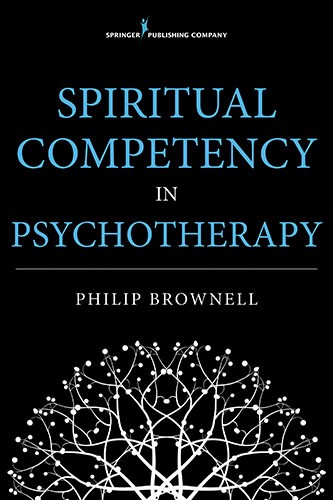 Philip Brownell starts Spiritual Competency in Psychotherapy with a quote from the Bible, which may put off some non-Christian counselors. However, he issues a disclaimer early in the text that although he brings in excerpts from other religious leanings, he generally discusses what he knows best—Christianity. The book, divided into three parts, has eighteen chapters that describe spirituality and religion according to both older and more recent religious beliefs.
Philip Brownell starts Spiritual Competency in Psychotherapy with a quote from the Bible, which may put off some non-Christian counselors. However, he issues a disclaimer early in the text that although he brings in excerpts from other religious leanings, he generally discusses what he knows best—Christianity. The book, divided into three parts, has eighteen chapters that describe spirituality and religion according to both older and more recent religious beliefs.
The first part of the book includes the first through the fifth chapters. Brownell delves into spirituality through the lenses of three faiths—Judaism, Christianity and Islam. He journeys with the reader through Eastern philosophies to the New Age movement. Brownell then discusses the similarities and differences between spirituality and religion, and makes it clear that though many apply the two terms interchangeably, clear differences exist. He touches on spirituality and religion from the psychological, philosophical, theoretical and coherentist points of view. He ends the first part of the book by discussing the process of personal spirituality and ethical issues for the various helping professions. Brownell uses the diagram of a strand of DNA to explain spirituality and religion as both a process and a relationship. Using personal anecdotes, he takes the reader through the process of spirituality and religion, and growth in spiritual maturity. Though Brownell does not advocate counselors necessarily sharing their clients’ spiritual and religious practices, he implores counselors to understand how these play a part in clients’ make-up.
In part two of the book, Brownell writes about how spirituality looks in therapy, providing a face for therapy in practice, especially from the Christian perspective. He admonishes counselors to “treat religious experiences as legitimate” (p. 50), but encourages them to question these experiences respectfully enough to know which aspect can be used to help clients. He avers that spirituality is more personal and individual, whereas religion is a communal experience. He provides examples from various religious beliefs to explain these differences to the counselor inclined towards spiritual competency. Much as researchers in multicultural competency in therapy advocate areas for counselor concentration, so Brownell urges counselors to be aware of their own assumptions, biases, behaviors and values, as they recognize how similar and/or different they may be from their clients.
Part three of the book deals with common spiritual issues encountered in therapy. Brownell approaches this part from an existential perspective and establishes that every counselor can grow in spiritual competency to help clients achieve the help they need. The section would have been complete with case studies of counselors applying spiritual competencies with clients from various religious orientations, but Brownell provides additional information. He urges counselors to work especially in the here-and-now with clients and reaffirms what most research on client outcomes indicates as helpful—making connections with clients. Brownell demonstrates how spiritual competency endows counselors with skills necessary to help clients take bold steps and explore uncertain areas in their lives. Finally, Brownell addresses a sensitive topic in religious circles—the abuse of clients by religious leaders. He emphasizes the burden upon counselors in upholding the trust of clients, and also encourages counselors to work with religious leaders to benefit clients. Brownell points out that counselors deal with clients as well as their faith community and what that faith teaches. Counselors are not to act as theologians or evangelists but are encouraged to discover how clients interpret their faith and how this interpretation manifests in therapy. He ends the book with a look at death—that of both clients and their loved ones—and counselors’ role in providing support for clients’ meaning making.
In summary, Brownell’s book advocates for the need to combine ethical codes in any helping professional field with good judgment and knowledge of various religious beliefs. Though many examples are Christian-based, the book is still relevant for both the beginner and expert counselor. It is fashioned in a way that allows the reader to move to any chapter that addresses his or her particular needs. Although Brownell discloses his Christian background early on, he does not approach the subject of spirituality with the emphasis one might have expected from a minister.
Reviewed by: Hannah E. Acquaye, doctoral student in counselor education, University of Central Florida, Orlando, Florida.
Brownell, P. (2015). Spiritual competency in psychotherapy. New York, NY: Springer.
The Professional Counselor
